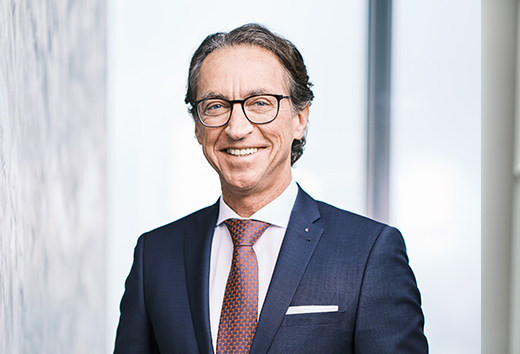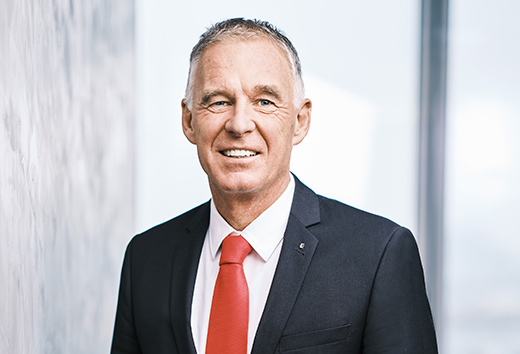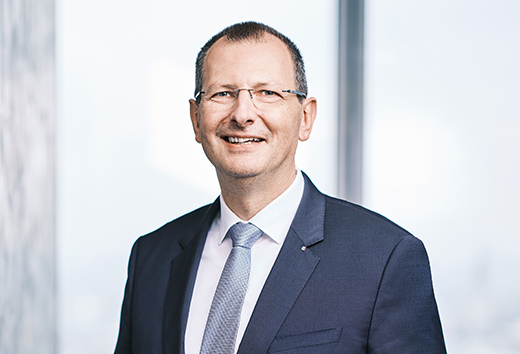
Dr. Andreas Kolar Member of the Management Board
Dr. Leonhard Schitter Chairman of the Management Board
Dipl.-Ing. Stefan Stallinger MBA Member of the Management Board
The LOOP project has set out the strategic realignment for Energie AG Oberösterreich. What were the main milestones and successes in this project, and what measures will need to be taken in future to achieve the goal of climate neutrality by 2035?
Leonhard Schitter: The internal strategic project LOOP represents a major strategic realignment for Energie AG Oberösterreich, the main aim of which is to decarbonise the company’s entire energy cycle – from generation and distribution to utilisation. It is our answer to evolving customer demands and the ever more stringent legal requirements. During 2023 we took key strategic decisions with a view to achieving climate neutrality by 2035 – providing we can guarantee security of supply.
One central aspect of LOOP is the expansion of renewable energy generation, in particular through photovoltaic systems, wind energy and hydroelectric power. By 2035, Energie AG plans to raise total renewable electricity production to around 1,200 GWh/a, cutting greenhouse gas emissions significantly in the process. The building of the Ebensee pumped-storage power plant will play a big role in this, contributing to supply and grid security. The use of biomass, geothermal energy and industrial waste heat for sustainable heat supplies underpins our decarbonisation strategy. The development of hydrogen will also support the new approach.
For the next fiscal year, we have concrete measures planned to further our strategic ambition of climate neutrality while taking account of the technical, legal and economic framework conditions. Another key focus is on encouraging innovations in order to develop and strengthen the innovative flair of the company. At the heart of this are such fields of activity as the customer experience, e-mobility and innovative storage technologies.
“The internal strategic project LOOP represents a significant realignment for Energie AG. The aim is to decarbonise the company’s entire energy cycle, from generation and distribution to utilisation. One core aspect will be the expansion of renewable energy production, with the focus on photovoltaic systems, wind energy and hydroelectric power. We will also use biomass, geothermal energy and industrial waste heat for sustainable heat supplies. Another key focus is on encouraging innovations in order to develop and strengthen the innovative flair of Energie AG.”
In view of the current financial challenges, what is Energie AG doing to ensure financial stability while continuing to invest in the energy transition?
Andreas Kolar: In the years and indeed the decades ahead, sustainability and protecting the climate will influence and determine policy, business and society in general. This development will impact all business, and of course it will affect Energie AG to a considerable degree.
We are just at the start of an unprecedented transformation of the energy system, one of historic proportions. The transformation will call for massive investment over the decades ahead. Energie AG is lining up major investment programmes that will enable us to uphold our responsibilities and make our contribution to the process. The main areas of our investment plan are projects aimed at boosting renewable energy production, establishing storage capacities and, hand in hand with this, expanding our electricity grids as necessary.
These wide-ranging investment plans will be based on the solid and stable fiscal foundation that we have established over recent years. This includes a basically profitable business model capable of freeing up financial resources to fund investments. We also need the corresponding debt sustainability to support borrowing. Energie AG has very good creditworthiness and an excellent standing on European financial markets. As a reliable and credible partner to investors and lenders, we are in a position to accommodate the additional financial resources needed to finance long-term projects in the interests of transforming the energy system under attractive conditions.
That said, fiscal stability is not the only success factor in meeting the challenges of the future – investors are increasingly looking at the sustainability levels of projects and companies. Sustainability here is measured by whether an economic activity makes a substantially positive contribution to the achievement of sustainability goals. In this context, of course, the investment schemes of Energie AG always look likely to earn recognition and ultimately financial support.
“We are just at the start of an unprecedented transformation of the energy system, one of historic proportions. The transformation will call for massive investment over the decades ahead. Energie AG is lining up major expansion programmes that will enable us to take our responsibilities and make our contribution to the process. The main areas of our investment plan are projects aimed at boosting renewable energy production, establishing storage capacities and, hand in hand with this, expanding our electricity grids as necessary.”
Which technological developments do you regard as critical to the ongoing success of the energy revolution, and how will you ensure these are integrated into existing systems?
Stefan Stallinger: In an energy system increasingly based on decentralised generation, with all its strong fluctuations, we need to change course in many areas. To balance out daily fluctuations and compensate for seasonal discrepancies in renewable generation and consumption, we rely on a range of storage technologies. Green hydrogen will play a key role as a climate-neutral and storable energy source as regards seasonal shifts in green electricity. Through our participation in research projects, for example, we are looking into the large-volume storage of hydrogen in depleted gas storage facilities.
By considering different sectors in an all-round, integrated way, we will be able to utilise existing energy more efficiently, minimise dependence on global energy imports and cut emissions of greenhouse gases. In the heating unit, we are continually working to consolidate and optimise our sustainable district heating networks. We are learning new things and basing innovative processes on projects aimed at linking industrial waste heat and other sustainable sources with consumers and storage facilities. In future, integrated energy can become a reality not just through the utilisation of industrial waste heat, but also through the generation of green hydrogen from renewably produced electricity.
Digital technologies are an important element in all areas of the Group, not only for presenting our customers with forward-looking offers, but also in terms of incorporating the energy transition into our processes. We are building up a broad portfolio of digital services, starting with the PV connection assessment and moving on to customer interaction services and data analysis at national level. In the field of data analytics, innovative technologies like artificial intelligence are becoming ever more important – not least in upholding the quality of electricity supplies. Our activities are aimed at deploying resources sparingly while promoting environmentally sound technologies.
“In an energy system increasingly based on decentralised generation, with all its strong fluctuations, Energie AG needs to change course in many areas. To balance out daily fluctuations and compensate for seasonal discrepancies in renewable generation and consumption, we rely on a range of storage technologies such as pumped-storage power plants and green hydrogen. In the process, digital technologies are helping us incorporate the energy transition into our processes – starting with the PV connection assessment and moving on to customer interaction services and data analysis at national level.”
What strategic measures is Energie AG taking in the face of persistently volatile energy markets and geopolitical insecurity?
Andreas Kolar: As a company in control of critical infrastructure, Energie AG has always had a working crisis management system that can be called upon at any time. To counter the negative effects of the generally challenging framework conditions, which have only worsened since the pandemic, we have enacted new measures across the various divisions of the company.
We have continued to consolidate our risk management systems while sharpening the focus of our risk strategy. In order to manage risks and opportunities more effectively in volatile times, a permanent Risk Committee was set up. The Committee is tasked with analysing our risk positions more fully, and on that basis deriving key facts to drive decision-making on behalf of the Management Board. In addition, a crisis unit drawn from all relevant Group entities was set up when Russia launched its war of aggression against Ukraine in order to support necessary decisions as effectively as possible in line with regular situation reports.
Improving the monitoring of liquidity and counterparty risks has also been critical in terms of keeping the risk situation in check. The guidelines thereby produced have been useful when deciding whether to favour stock markets or bilateral partners on the trading side.
Filling the Group’s gas storage facilities early was another important step as regards guaranteeing security of supply in winter for our customers. Energie AG has not concluded any direct contracts with Russian partners. The company sources gas via the stock exchange or bilateral partners in Switzerland and France.
On the sales front, a long-term procurement strategy is helping the company offer customers fair average prices. Continual monitoring of the development of counterparty risks and the conclusion of credit insurance to avoid specific large-scale risks are key elements of risk management on the sales side. Last but not least, of course, we are always monitoring legally relevant geopolitical issues to assess their impact on the company. So far, all of these measures have helped Energie AG maintain its financial stability. We have no doubt we can continue to thrive even in these turbulent times by holding our present course.
There are major challenges facing the grid infrastructure. How does Energie AG intend to manage these, and how will the expansion of renewable energy sources make a difference?
Stefan Stallinger: High-performance energy grids will be central to energy provision in the future. Massive expansion of the grid will be needed to ensure supplies of electrical energy as well as renewable gases like biogas and hydrogen.
Expanding and strengthening the electricity grids will involve complex tasks, especially as we seek to make rapid progress in giving all parties the opportunity to feed decentrally produced green electricity into the grid. PV plants with total output of more than a gigawatt are now connected to the power grid of Netz Oberösterreich. To ensure quantities of electricity continue to be transported to the places they are needed at all grid levels, the power grid must be expanded accordingly. Material shortages caused by lengthy delivery times remain a challenge to implementation. One encouraging development is the fact that the general public increasingly regards high-performance power grids as a key plank of the energy revolution and the cornerstone of supply security.
Putting regulatory incentives in place will create the basis for investment in the grid infrastructure, ensuring expansion is not impeded by financial obstacles like low interest rates. What’s more, transformation of the energy system often faces delays because project approvals can take a long time to obtain.
In the long haul, the expansion of renewable generation and infrastructures and our efforts to achieve climate goals will secure jobs and uphold quality of life for the future. Our employees are delivering a valuable contribution to the transformation of the energy system.
Energie AG has made great strides as regards diversity and inclusion. How do you plan to further these initiatives in the interests of an even more inclusive corporate culture?
Leonhard Schitter: Over the past fiscal year, Energie AG Oberösterreich has taken big steps aimed at encouraging innovation and establishing a more open and diverse corporate culture. One key move was the founding of DiversiTeam, a project group addressing topics such as inclusive leadership, cultural change, barrier-free access, regionality, the advancement of women and communications. Events like the Diversity Café were initiated to encourage discussion of diversity-related themes among employees and define concrete measures for Energie AG.
To raise awareness, the e-learning unit “Diversity Basics” was introduced and has already been successfully completed by more than a thousand employees. Elsewhere the number of scholarships for women in technical professions was doubled to promote gender equality.
At the same time, Energie AG puts great value on a respectful and appreciative corporate culture, innovation and fresh ideas. We want all employees to reach their full potential and contribute their different perspectives. The promotion of gender equality and equality of opportunity is another key factor in ensuring everyone feels respected and included. Purposeful apprentice training will supply the Group divisions with the specialists they need, and from a social policy viewpoint, send out an important signal in favour of diversity.




